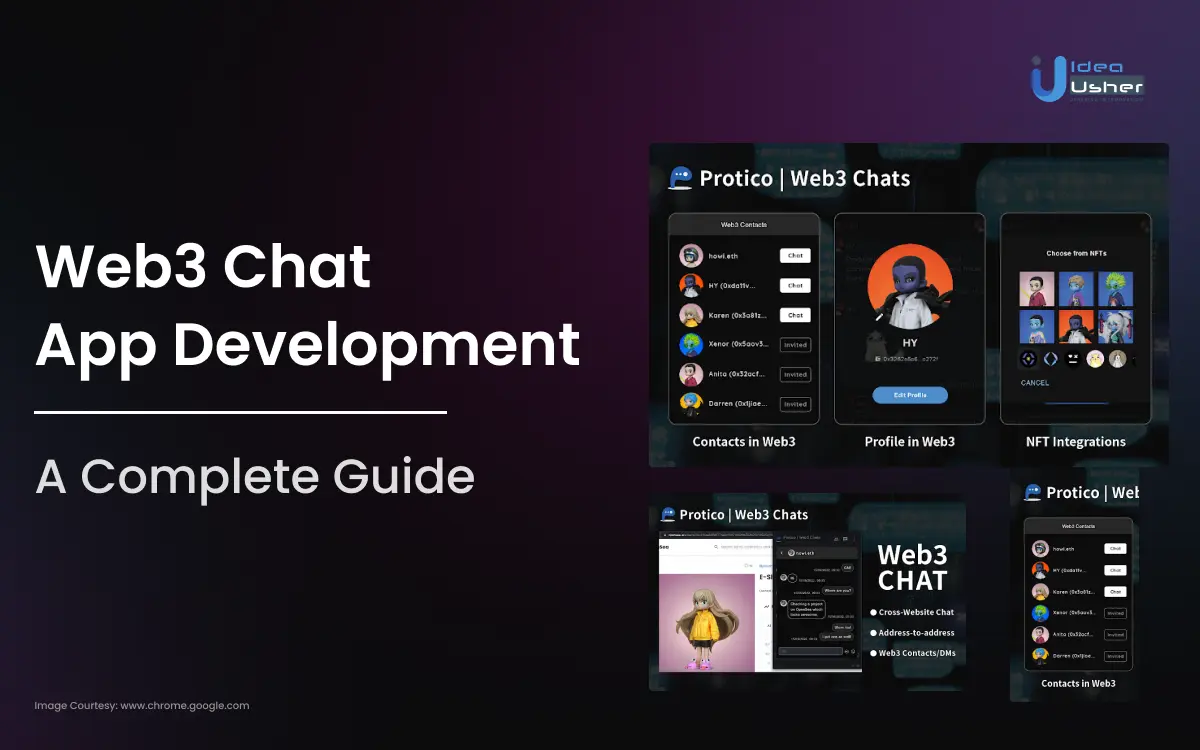Web3 represents a paradigm shift in the way we interact with the online world, embracing decentralization, user-centric identity, and blockchain technology to reimagine how we communicate. At the heart of this transformation lies Web3 chat app development, where cutting-edge technology converges with the timeless need for secure, private, and user-controlled messaging.
In this blog, we’ll explore Web3 chat app development, unveiling the key steps, must-have features, and the myriad benefits that this revolution promises.
Read on to know the future of communication.
What is a Web3 Chat App?
Web3 chat apps are revolutionizing the way we communicate online. Unlike traditional messaging platforms, which rely on centralized servers and corporations, Web3 chat apps use blockchain technology to decentralize communication. This means users have more control over their data, privacy, and security. Web3 chat apps offer end-to-end encryption, ensuring that only the intended recipients can access the messages. They also empower users with ownership of their digital identities and assets, fostering a new era of trust and transparency. With the advent of Web3 chat apps, online conversations are evolving, providing users with more autonomy and security in their digital interactions.
How Does a Web3 Chat App Work?
Web3 chat apps are a cutting-edge evolution of traditional messaging platforms, leveraging blockchain technology and decentralized principles to provide users with more control, privacy, and security. Here’s a closer look at how these innovative apps work:
Decentralized Infrastructure:
Unlike conventional chat apps, which rely on centralized servers owned and controlled by a single entity, Web3 chat apps operate on a decentralized network. These networks are powered by blockchain technology, which stores data across a distributed ledger of nodes, making it almost immune to censorship and downtime.
Blockchain Technology:
Web3 chat apps utilize blockchain technology to establish trust, verify identities, and maintain the integrity of messages. Each chat message is cryptographically secured on the blockchain, ensuring its authenticity and preventing tampering.
End-to-End Encryption:
Security is a paramount concern in Web3 chat apps. Messages are protected using end-to-end encryption, which means that only the sender and recipient can decrypt and read the messages. Even the service provider cannot access the content of the messages.
User-Centric Identity:
Web3 chat apps prioritize user-centric identity. Instead of relying on centralized authentication methods, users control their own digital identities through blockchain-based self-sovereign identity systems. This empowers individuals to manage their online personas with more autonomy.
Data Ownership:
In Web3 chat apps, users retain ownership of their data. Unlike traditional apps, where your data may be monetized or sold without your consent, in Web3, you have more control over your personal information. You decide who accesses your data and for what purpose.
Interoperability:
Web3 chat apps are designed to be interoperable with other Web3 applications and services. This means you can seamlessly use your Web3 chat identity and communicate across various platforms, enhancing your online experience.
Decentralized Autonomous Organizations (DAOs):
Some Web3 chat apps are governed by decentralized autonomous organizations, allowing users to participate in decision-making processes. This democratic approach gives users a say in the app’s development and policies.
Cryptocurrency Integration:
Many Web3 chat apps integrate cryptocurrency wallets and payment features, making it easy to send and receive digital assets within your conversations. This simplifies the process of settling bills, sharing expenses, and conducting business transactions.
Web3 Chat App: Market Growth Stats
The growth of Web3 chat apps has been remarkable, with the global blockchain messaging apps market surging to a valuation of USD 22.3 million in 2021. The momentum is set to continue, as forecasts predict a robust compound annual growth rate (CAGR) of 43.6% from 2022 to 2030. This rapid expansion is a testament to the increasing demand for secure, decentralized, and user-controlled messaging solutions. As users seek enhanced privacy and data ownership, Web3 chat apps are poised to revolutionize online communication, paving the way for a more transparent, secure, and trust-based digital landscape.
Source: GRAND VIEW RESEARCH
Key Steps to Web3 Chat App Development
Creating a Web3 chat app is an exciting venture that can offer users greater control over their online conversations and data. To embark on this journey successfully, you need to follow some crucial steps that are unique to Web3 development. Here’s a comprehensive guide to help you get started:
Understand Web3 Fundamentals:
Before diving into Web3 chat app development, it’s essential to grasp the fundamentals of Web3 technology. You need a clear understanding of blockchain, decentralized networks, smart contracts, and cryptocurrency integrations. This knowledge will form the foundation of your app.
Select a Blockchain Platform:
Choose a blockchain platform that aligns with your project’s requirements. Ethereum is a popular choice, but other networks like Solana, Polkadot, and Binance Smart Chain offer unique features that may be more suitable for your app’s needs.
Define Your Use Case:
Identify the specific use case and target audience for your Web3 chat app. Is it for personal communication, business, or a niche community? Defining your use case will help you tailor the features and functionalities accordingly.
Design a User-Centric Identity System:
Web3 chat apps prioritize user-centric identity management. Consider integrating self-sovereign identity solutions like DID (Decentralized Identifier) and Verifiable Credentials to give users control over their digital personas.
Implement End-to-End Encryption:
Security is paramount in Web3. Incorporate end-to-end encryption to ensure that messages are only accessible to the intended recipients. Utilize encryption libraries and protocols like Signal Protocol for robust security.
Data Ownership and Privacy:
Develop features that allow users to own and control their data. Give them the ability to manage permissions and decide who can access their information, enhancing privacy and transparency.
Interoperability:
Ensure your Web3 chat app can interact with other Web3 applications. Implement open standards and protocols to allow seamless communication across various platforms, promoting a more interconnected Web3 ecosystem.
Token Economy:
Consider integrating a token economy within your chat app. This can enable users to send and receive cryptocurrency within their conversations, adding utility and facilitating seamless transactions.
Community Engagement and DAOs:
Encourage community engagement and governance through decentralized autonomous organizations (DAOs). Allow users to participate in decision-making processes, which can foster a sense of ownership and loyalty.
Test and Iterate:
Thoroughly test your Web3 chat app to identify and address any security vulnerabilities or performance issues. Iterate on the app’s design and features based on user feedback and changing market dynamics.
Compliance and Regulation:
Stay informed about the regulatory environment surrounding cryptocurrencies and blockchain technology. Ensure your Web3 chat app complies with applicable laws and regulations, particularly if you plan to integrate cryptocurrency features.
Launch and Marketing:
Once your Web3 chat app is ready, plan a strategic launch and marketing campaign. Engage with the Web3 community, utilize social media, and collaborate with influencers to generate interest and user adoption.
Essential Tech-Stack Needed for Web3 Chat App Development
Here are the key components and technologies that you’ll need for a successful Web3 chat app:
Blockchain Platform:
- Ethereum: The most popular choice, known for its extensive developer community and robust smart contract capabilities.
- Solana: Offers high throughput and low transaction costs, ideal for real-time interactions.
- Polkadot: Enables interoperability between different blockchains, enhancing the versatility of your app.
Smart Contracts:
- Solidity (for Ethereum): A popular language for creating smart contracts on the Ethereum blockchain.
- Rust (for Polkadot and Solana): Ideal for building secure and efficient smart contracts on these platforms.
Identity Management:
- DID (Decentralized Identifier): A core component of self-sovereign identity, ensuring users have control over their digital personas.
- Verifiable Credentials: Used to attest to the authenticity of information, enhancing trust and privacy.
End-to-End Encryption:
- Signal Protocol: A robust, open-source encryption protocol used to secure messages, ensuring that only the sender and recipient can decrypt them.
Decentralized Storage:
- IPFS (InterPlanetary File System): Utilize IPFS for decentralized storage of messages and media, enhancing data redundancy and accessibility.
Interoperability Protocols:
- Whisper (for Ethereum): Enables private and decentralized messaging on the Ethereum network.
- Wormhole (for Solana): Facilitates cross-chain communication and data transfer between Solana and other blockchains.
Token Standard:
- ERC-20 (for Ethereum): If your Web3 chat app involves a token economy, use the ERC-20 standard for creating fungible tokens.
- SPL (for Solana): Create and manage tokens on the Solana blockchain using the SPL token standard.
Web3 Libraries:
- Web3.js (for Ethereum): A JavaScript library that simplifies interactions with the Ethereum blockchain.
- Anchor (for Solana): A development framework for building Solana-based applications.
Community Engagement and DAOs:
- DAOstack: Implement DAOstack for creating decentralized autonomous organizations that allow users to participate in decision-making processes.
Web3 Development Frameworks:
- Truffle (for Ethereum): A popular development framework for Ethereum DApps.
- Near (for NEAR Protocol): Ideal for building DApps with user-friendly development tools and libraries.
Front-End Technologies:
- React.js: A popular JavaScript library for building user interfaces.
- Web3.js: Integrate Web3.js to enable interaction with the blockchain from the front-end.
Mobile App Development:
- React Native (for cross-platform development): Ideal for creating mobile versions of your Web3 chat app.
- Flutter (for cross-platform development): Another option for cross-platform mobile app development.
Must-Have Features for a Web3 Chat App
When developing a Web3 chat app, it’s essential to include features that not only provide a seamless and secure messaging experience but also leverage the advantages of blockchain technology and decentralization. Here are some must-have features for a Web3 chat app:
Decentralized Messaging:
Messages should be stored on a decentralized network, like a blockchain or IPFS, ensuring data integrity and censorship resistance.
End-to-End Encryption:
Implement strong encryption to secure messages, making them accessible only to the sender and recipient, enhancing privacy and security.
User-Centric Identity Management:
Enable users to have full control over their digital identities through self-sovereign identity solutions, like Decentralized Identifiers (DID).
Data Ownership and Control:
Give users the ability to manage permissions and control who can access their data, promoting transparency and data ownership.
Interoperability:
Facilitate communication with other Web3 applications and services to create a more interconnected digital ecosystem.
Token Integration:
Incorporate a token economy, allowing users to send and receive cryptocurrencies within chats for seamless transactions and utility.
Decentralized Autonomous Organizations (DAOs):
Implement DAOs for community engagement, enabling users to participate in decision-making processes and foster a sense of ownership.
User Verification and Trust Mechanisms:
Use blockchain technology to verify the authenticity of users’ identities, enhancing trust and reducing the risk of impersonation.
Cross-Platform Compatibility:
Ensure your app is accessible on various devices and platforms, including web, mobile, and desktop.
Open Source and Transparency:
Consider open-sourcing your app’s code to promote transparency, security audits, and community contributions.
Multimedia Support:
Allow users to send and receive various media types, such as images, videos, and documents, to enrich the chat experience.
Community and Support Channels:
Include channels for community discussion, support, and feedback to foster a strong user community.
Regulatory Compliance:
Stay informed about legal and regulatory requirements related to cryptocurrencies and blockchain technology to ensure compliance.
Backup and Recovery:
Implement backup and recovery options to help users regain access to their data and conversations in case of device loss or data corruption.
Multi-Language Support:
Make your app accessible to a global audience by supporting multiple languages.
Cross-Chain Compatibility:
If your app operates on multiple blockchains, ensure compatibility and ease of transfer between them.
Key Benefits of Web3 Chat App
Web3 chat apps offer a range of advantages that set them apart from traditional messaging platforms. As the digital landscape continues to evolve, these benefits are reshaping the way we communicate online. Here are some of the key advantages of Web3 chat apps:
Decentralization:
Web3 chat apps operate on decentralized networks, often leveraging blockchain technology. This decentralization eliminates the need for a central authority or server, enhancing censorship resistance and making it difficult for a single entity to control or monitor user interactions.
Enhanced Privacy and Security:
Web3 chat apps prioritize privacy and security. They typically incorporate end-to-end encryption, ensuring that messages are only accessible to the sender and recipient. This advanced level of security guards against eavesdropping and unauthorized access.
User-Centric Identity Management:
Users have more control over their digital identities in Web3 chat apps. Self-sovereign identity solutions like Decentralized Identifiers (DID) enable users to manage their online personas with autonomy, reducing reliance on centralized authentication methods.
Data Ownership:
Unlike traditional messaging apps that often monetize user data without consent, Web3 chat apps put data ownership back in the hands of users. They can decide who accesses their data and for what purposes, promoting transparency and trust.
Interoperability:
Web3 chat apps are designed to be interoperable with other Web3 applications and services. This means users can seamlessly use their Web3 chat identity and communicate across various platforms, creating a more connected digital ecosystem.
Token Economy Integration:
Many Web3 chat apps integrate cryptocurrency wallets and payment features, allowing users to send and receive digital assets within their conversations. This simplifies settling bills, sharing expenses, and conducting business transactions.
Community Governance:
Some Web3 chat apps are governed by decentralized autonomous organizations (DAOs), where users can participate in decision-making processes. This democratic approach gives users a say in the app’s development and policies.
Transparency and Trust:
The use of blockchain technology enhances transparency. Users can verify the authenticity of messages, ensuring that they are not altered or manipulated. This trust in the integrity of the communication is a fundamental benefit of Web3 chat apps.
Resistance to Centralized Surveillance:
Web3 chat apps are less susceptible to government surveillance and data breaches. The decentralized nature of these platforms makes it challenging for authorities to monitor or censor conversations.
Global Accessibility:
Web3 chat apps can be accessed by anyone with an internet connection, transcending geographical boundaries. This global accessibility is particularly valuable for individuals in regions with limited access to traditional communication channels.
Empowerment and Autonomy:
Web3 chat apps empower users by giving them greater control over their digital interactions. Users can determine who they connect with, what data they share, and how they participate in the app’s governance.
Top Examples of Web3 Chat App in the Market
Here are the top 5 examples of Web3 chat apps in the market:
1. Oxchat
Oxchat is a Web3 chat app that allows users to communicate with each other using their wallet addresses. It is built on the Ethereum blockchain and supports a variety of wallets, including MetaMask, Coinbase Wallet, and Trust Wallet. Oxchat is a good option for users who want a secure and anonymous way to communicate with each other.
2. Secretum
Secretum is a Web3 chat app that is built on the Solana blockchain. It offers end-to-end encryption and allows users to send and receive cryptocurrency payments directly within the app. Secretum also has a built-in decentralized exchange, which allows users to trade cryptocurrencies without having to go through a third-party exchange.
3. Element
Element is a Web3 chat app that is built on the Matrix protocol. It is open-source and offers a variety of features, including end-to-end encryption, file sharing, and voice and video calling. Element also supports a variety of bridges, which allow users to connect to other chat platforms, such as Telegram and WhatsApp.
4. Status
Status is a Web3 chat app that is built on the Ethereum blockchain. It is a good option for users who want a secure and private way to communicate with each other. Status also offers a variety of features, including end-to-end encryption, file sharing, and voice and video calling.
5. DappRadar Chat
DappRadar Chat is a Web3 chat app that is built on the Polygon blockchain. It is a good option for users who want to connect with other people in the Web3 ecosystem. DappRadar Chat also offers a variety of features, including end-to-end encryption, file sharing, and voice and video calling.
Conclusion
The evolution of Web3 chat app development is poised to redefine the way we communicate in the digital realm. As we wrap up our exploration of this groundbreaking technology, it becomes evident that the fusion of decentralization, enhanced security, and user empowerment offers a tantalizing vision for the future of communication.
Web3 chat apps provide a secure, private, and user-centric environment where individuals can engage in meaningful conversations while retaining ownership of their data and digital identities. The benefits are undeniable – resistance to centralized surveillance, enhanced transparency, and a trust-infused digital landscape.
What IdeaUsher Can Do For You?
IdeaUsher is your all-in-one partner for transforming ideas into reality. We offer a comprehensive suite of services, from concept development to web and mobile app creation, blockchain integration, and digital marketing. Our expert team provides consultation, UI/UX design, and strategy formulation to guide your project. We can assist in prototyping and MVP development, ensuring cost-effective testing of your concepts. With custom solutions tailored to your unique needs, ongoing support and maintenance, and expertise in Web3 chat app development, IdeaUsher is your dedicated innovation partner.
Work with Ex-MAANG developers to build next-gen apps schedule your consultation now
Frequently Asked Questions
Q. How is Web3 Chat App Development different from traditional chat app development?
A. Web3 Chat App Development prioritizes decentralization, user-centric identity management, and data ownership. It offers enhanced privacy, security, and transparency, while traditional chat apps rely on centralized servers and often compromise user data privacy.
Q. What are the key benefits of Web3 Chat App Development?
A. Web3 Chat Apps offer benefits such as enhanced security, resistance to censorship, user data ownership, interoperability, user-controlled identity, and integration of cryptocurrencies for seamless transactions.
Q. What technologies are commonly used in Web3 Chat App Development?
A. Technologies such as blockchain platforms (e.g., Ethereum, Solana), decentralized storage (e.g., IPFS), self-sovereign identity solutions, end-to-end encryption protocols, smart contracts, and token standards (e.g., ERC-20) are commonly used in Web3 Chat App Development.
Q. What are the regulatory considerations for Web3 Chat App Development?
A. Developers in the Web3 space must stay informed about the evolving regulatory landscape, especially concerning cryptocurrencies and blockchain technology. Compliance with applicable laws and regulations is essential, as it may vary by jurisdiction. Engaging legal experts is advisable to ensure adherence to the law.






















